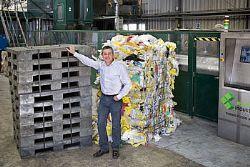A KITCHEN experiment has led a Christchurch man to a solution for one of the world’s biggest environmental problems – how to dispose of the ubiquitous plastic shopping bag. Each year between 500 billion and a trillion plastic bags are used worldwide but only about one percent get recycled because until now there has been no commercially viable and environmentally-friendly way to recycle them. But Matthew Darby and business partners Hamish McCrostie and former All Black Byron Kelleher have changed that by developing a process known as Thermofusion – which turns the bags into molten plastic which can then be molded into usable items, such as plastic shipping pallets for export use. The process is a world-first and the trio’s company, Range Industries, now has a patent on it. “The plastic waste goes into one end and a plastic pallet comes out the other end,” Darby explains. “It’s a world first in so far as it is a machine that can take plastic waste from virtually any waste stream and re-process it.’’ Although a number of plastic recycling plants are operating around the world the vast bulk of waste plastic does not get recycled because it is either of mixed grade or contaminated. In New Zealand alone about 12,000 tonnes of flimsy, light-gauge plastic bags are dumped in landfill each year. “What we wanted to do is develop a technology for plastic that wasn’t already being recycled,’’ says Darby, who came up with the revolutionary concept for recycling the bags after several nights of experimenting in his kitchen. “I had a pile of plastic bags and I started playing around with melting them. I tried various kitchen appliances and then I hit upon the toasted sandwich maker because I could control the heat,’’ he recalls. Having worked out how to melt the plastic, the next challenge was to find a way to cool it down. “Cooling the plastic down was problematic because, of course, I couldn’t run the toasted sandwich maker under water, so I decided to put it in the freezer,” Darby recalls. “That’s how we initially came up with the process. Then we just had to work out how we could do it in a more controlled way.’’ Darby and his partners spent three years designing a prototype machine. Following proven performance, the technology was used to design a commercial production machine which could operate around the clock from Range Industries’ Bromley factory and reprocess half a ton per hour. And it’s not just plastic bags that it can chomp up and spit out into plastic pallets, the machine can handle all types of plastics and requires no pre-processing, sorting or cleaning. “We’re currently in discussion with five off-shore companies wishing to purchase machines from us,” says Darby. Byron Kelleher, who is now playing rugby for Toulouse in France, has been heading the company’s European marketing efforts. Kelleher says that the European market is tuned into recycling and people there are very interested in machinery that can take contaminated plastic waste and make useful products. “It would be fair to say that they are more environmentally aware than New Zealand and see sustainability as a key component of the environmental debate,” he says. Darby says while there is a huge market for plastic shipping pallets - one overseas company wanted Range Industries to supply 50 million – the company’s focus is on getting the technology they have developed out to the rest of the world. “Essentially we set up this Christchurch operation to prove the process – and we’ve done that. We’ve shown it works. We could take every bit of waste plastic that Christchurch consumes and turn it into pallets. “We started this because we wanted to do something to help protect our environment. Apart from our actual processing of waste plastic, we see the opportunity to support a wider environmental care programme through the manufacture and supply of the Thermofusion machine.” Range Industries employs 18 people and sources all its waste plastic and machinery components in New Zealand. It has received strong support from regional waste minimisation groups who would rather see their waste used by a New Zealand company to help the export industry than have it shipped to China for incineration.
Toastie machine leads to recycling process
General
Tuesday, 29 July 2008






